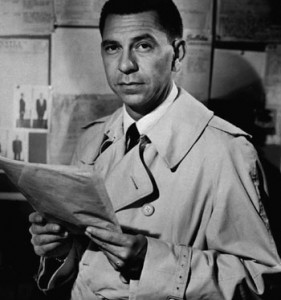The Case of the Crime King was Richard Deming’s second original Dragnet tie-in novel for the original 1951-59 TV series.
The book focuses on Lt. Joe Friday and Sergeant Frank Smith’s efforts to break up a robbery ring. The case begins with the arrest of a clever criminal who Friday and Smith catch and send to prison.
Word begins to leak out of prison that about a new statewide gang with plans to accumulate a fortune and use the money to get one big score that will leave them living like kings. Friday and Smith are sure their man is behind it, but proving it is another matter.
The stakes have never been higher in a Dragnet case file as the lives of thousands and the freedom of millions depend on Friday and Smith stopping this criminal gang’s plot.
Like in his first effort, The Case of the Courteous Killer, Deming manages to capture the spirit of Dragnet, only telling a more complex case. In many ways, the case calls to mind the 1954 Dragnet film which focused on a gang-related investigation, only there are no out-of-character moments for Friday or Smith and we get a more satisfying resolution. The criminal is genuinely clever and the narrative remains at a strong level throughout. Unlike The Case of the Courteous Killer, there’s not really a sag in the story.
Worth noting is that The Case of the Crime King acknowledged the existence of steamier sides of life and Los Angeles that the 1950’s series avoided as it includes references to prostitutes and the criminals use an adult movie theater as an alibi. Neither aspect is written about in a salacious manner, but it does signal a slight shift that would be seen in the 1960’s revival.
On October 5, 2019, a review was held in the City of Boise, in and for the County of Ada. In a moment, the results of that review:
Verdict:
I will say that while this book was a fun read, I didn’t enjoy it quite as much as the Case of the Courteous Killer. That case had a killer who came after Sergeant Friday and put him in peril. Here the criminals are dangerous but far more methodical. It also had less of Smith’s humor, which disappointed.
If you love Dragnet and you like mysteries of this era Dragnet: The Case of the Crime King is a worthwhile read and at $2.99 in the Kindle Store, it’s a great deal. It’s a well-written case that was probably better than most of the episodes aired during the original series’ final season.
Rating: 4.25 out of 5
This post contains affiliate links, which means that items purchased from these links may result in a commission being paid to the author of this post at no extra cost to the purchase

